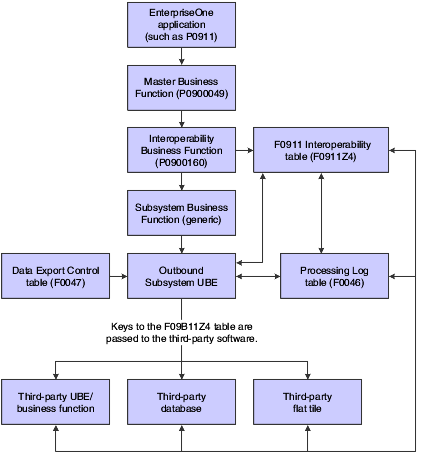17 Processing Interoperability for General Accounting
This chapter contains the following topics:
-
Section 17.1, "Understanding Interoperability for General Accounting"
-
Section 17.2, "Setting Up Outbound Interoperability for General Accounting"
-
Section 17.3, "Purging Interoperability Transactions for General Accounting"
17.1 Understanding Interoperability for General Accounting
JD Edwards EnterpriseOne General Accounting provides interoperability functions to facilitate the exchange of data with systems that are external to JD Edwards EnterpriseOne.
17.1.1 Outbound Transactions
In JD Edwards EnterpriseOne General Accounting, these programs call the Journal Entry MBF Processing Options (P0900049), which enable you to specify a version of the F0911 Interoperability Processing Options program (P0900160) to write information to the Account Ledger table (F0911). All of these programs can create outbound interoperability transactions:
-
Journal Entries (P0911).
-
Journal Entries with VAT (P09106).
-
Journal Entry Batch Processor (R09110Z).
-
Store and Forward JE Batch Processor (R09110ZS).
-
Recurring Journal Entry Compute & Print (R09302).
-
Indexed Computations Compute And Print Report (R093021).
-
Variable Numerator Compute and Print (R093022).
These General Accounting programs can also create outbound interoperability transactions, although they do not call the Journal Entry Master Business Function to write information to the F0911 table; instead, they use version ZJDE0001 of the F0911 Interoperability Processing Options program (P0900160):
-
General Ledger Post Report (R09801)
-
Detailed Currency Restatement (R11411)
The system stores outbound interoperability transactions that are created by General Accounting programs in the F0911 Interoperability Table (F0911Z4).
17.1.2 Automatic Accounting Instructions for Outbound Interoperability
To reduce the number of transactions that the system writes to the F0911Z4 table, you use automatic accounting instruction (AAI) items GLOBxx to define ranges of accounts. The system verifies that an account number is within the ranges that you define before it writes a transaction to the F0911Z4 table.
You can define up to 49 account ranges using AAI items GLOBxx. You must define complete ranges consisting of a beginning and an ending AAI item. The first range must begin with GLOB01. We recommend that you end the first range with GLOB02, the next consecutive number. Define the next range, if needed, to start with GLOB03 and end with GLOB04, and so on.
See "Setting Up the General Accounting System, Setting Up AAIs for General Accounting" in the JD Edwards EnterpriseOne Applications General Accounting Implementation Guide.
17.1.3 Example: Outbound Interoperability
This example shows one outbound interoperability process:
Figure 17-1 Example of the General Accounting Outbound Interoperability process

Description of "Figure 17-1 Example of the General Accounting Outbound Interoperability process"
In this example, transactions are created in the General Accounting Journal Entry program (P0911) in JD Edwards EnterpriseOne and sent through the outbound interoperability process to a third-party software package.
|
See Also: |
17.2 Setting Up Outbound Interoperability for General Accounting
This section provides an overview of outbound interoperability setup for General Accounting, lists prerequisites, and discusses how to set processing options for the F0911 Interoperability Processing Options program (P0900160).
17.2.1 Understanding Outbound Interoperability Setup for General Accounting
To enable outbound processing, you specify the transaction type in the corresponding processing option in the F0911 Interoperability Processing Options program (P0900160).
If you create additional versions of the F0911 Interoperability Processing Options program for other transaction types, you must specify the version in the processing option of the Journal Entry MBF Processing Options (P0900049).
If you create additional versions of the Journal Entry MBF Processing Options program, you must specify the version in the processing option of the journal entry program that uses the master business function processing options.
17.2.2 Prerequisites
Before you complete the tasks in this section:
-
Define the data export controls for the type of outbound transaction.
The system uses data export controls to identify the batch programs or business processes that third parties provide for use in processing transactions.
-
Define the flat file cross-reference if you need to write the data to a flat file because the interface table does not conform to the format that is required by the external system.
17.2.3 Setting Processing Options for F0911 Interoperability Processing Options (P0900160)
Processing options enable you to specify the default processing for programs and reports.
17.2.3.1 Interop
- Transaction Type
-
Specify the type of interoperability transaction (00/TT). If you leave this processing option blank, the outbound interoperability is not performed.
Note:
The system provides transaction type JDEJE for journal entries. - Before Image
-
Specify whether the system creates a record of the journal entry before it was changed, in addition to a record of the journal entry after the change. The system creates these records in the F0911 Interoperability Table (F0911Z4) when outbound interoperability processing is enabled. Values are:
Blank: Write the journal entry record only after it has been changed; do not write a before image record.
1: Write two journal entry records: one before the journal entry is changed and one after the journal entry is changed.
17.3 Purging Interoperability Transactions for General Accounting
This section provides an overview of purging interoperability transactions and discusses how to purge interoperability transactions.
17.3.1 Understanding Purging Interoperability Transactions
When data becomes obsolete or when you need more disk space, you can use the Purge Interoperability Table programs to remove data from the interoperability tables.
For records in the Processing Log table (F0046) that are marked as processed, the program purges the associated transactions in the F0911Z4 interoperability table, as well as the records in the F0046 table. If the records in the F0046 table are not marked as processed, the program does not purge any records.